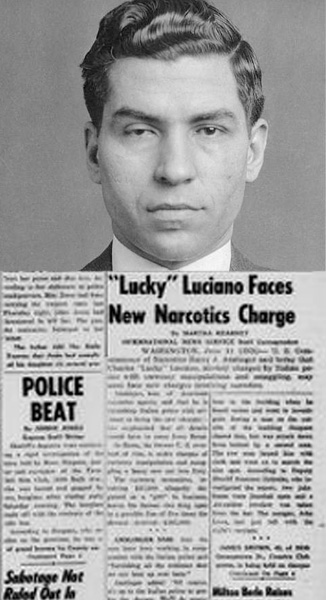Lucky Luciano: The Mobster Architect
Salvatore Lucania, better known as Lucky Luciano, was born on November 24, 1897, in Lercara Friddi, Sicily. Luciano would go on to become one of the most influential and cunning mob bosses in American history, reshaping the landscape of organized crime during the early to mid-20th century.
Luciano’s family immigrated to the United States, settling in New York City. In his youth, he became involved in petty crime and soon found himself drawn to the lucrative world of organized crime that dominated the streets of New York during the Prohibition era.
By the 1920s, Luciano was deeply entrenched in the criminal underworld. His intelligence and organizational skills quickly caught the attention of his peers. Lucky Luciano rose through the ranks, forming alliances and expanding his influence. He was instrumental in creating the National Crime Syndicate, a loose confederation of Mafia families that sought to control organized crime across the country.
One of Luciano’s most significant contributions to organized crime was his innovative approach to leadership. He recognized the need for a more structured and business-like organization, deviating from the traditional hierarchical structure of the Mafia. This new model allowed for increased efficiency and cooperation between different criminal enterprises.
Luciano’s empire, however, faced a significant setback when he was convicted on charges of compulsory prostitution in 1936. He was sentenced to 30 to 50 years in prison. While behind bars, Luciano continued to exert influence over the crime syndicate, orchestrating major decisions from his cell.
During World War II, Luciano’s fortunes took an unexpected turn. In exchange for his assistance in the war effort, particularly in helping prevent sabotage in the New York docks, the U.S. government commuted Luciano’s sentence. In 1946, he was released from prison and deported to Italy.
Living in exile, Luciano continued to play a role in international organized crime. He maintained connections with American mobsters and European criminal networks. Despite being thousands of miles away from his former empire, Lucky Luciano’s influence endured.
Salvatore “Lucky” Luciano died on January 26, 1962, in Naples, Italy. His legacy is a complex one—admired by some for his strategic mind and ability to modernize organized crime, while condemned by others for his involvement in illicit activities that plagued American society.
Today, Lucky Luciano is remembered as a key figure in the evolution of organized crime. His impact on the structure of criminal organizations and their approach to business has left a lasting mark on the history of the American Mafia.
